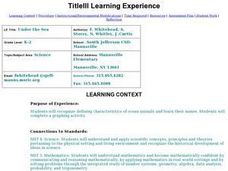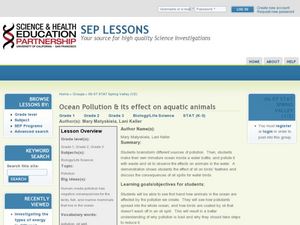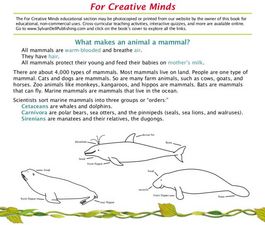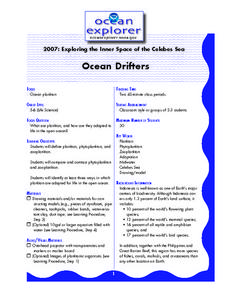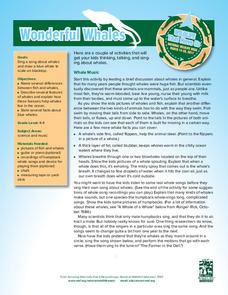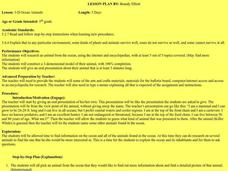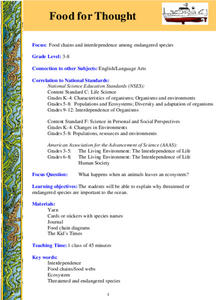Curated OER
Under the Sea - Ocean Mammals/Fish
Learners explore the similarities and differences between ocean mammals and fish. The characteristics of the life forms observed are placed onto a graph. The classroom becomes the botom of the sea and is explored to gain the required data.
Curated OER
Paper Clay Fish Sculpture
Why not get creative and use paper clay to create colorful fish sculptures? All the steps needed to complete this activity are included. Your class will sculpt beautiful fish while exploring color, shape, and creative thinking. Use these...
Curated OER
Ocean Pollution & its Effect on Aquatic Animals
Young scholars consider the concept of ocean pollution. In this ocean lesson, students participate in a hands-on demonstration in order to replicate an oil spill and its effects on marine life.
Curated OER
For Creative Minds: What Makes an Animal a Mammal?
Students read about categories of mammals and their features. Students then construct a marine animal, using given print outs in the lesson. Students then create adaptations for their mammal, using a web site reference for guidance.
Curated OER
Follow a Fish
Students choose a fish from anywhere within the Ocean Center. They observe it for a given time, recording its behavior. Students comprehend the concept that living things have individual characteristics that enable them to live in their...
Curated OER
The Ocean
Plant and animal life of the ocean is the focus of this science lesson. Young scientists sort a variety of seashells and explore why many sea animals have shells. They examine the shells, write journal entries highlighting the...
Curated OER
Ocean Drifters
Students define terms, and identify three ways in which plankton are adapted for life in the open ocean. In this ocean drift lesson students design a planktonic organism.
Curated OER
Helping Right Whales - Right Now
In this whales worksheet, pupils answer eight questions referring to the right whales found in the Atlantic Ocean. Students read a map to answer three questions and five questions are multiple choice.
Curated OER
Wonderful Whales
Primary marine biologists consider the largest living animals on Earth, the whales. Introduce them to general anatomy, unique adaptations, and behaviors. Teach them to sing a song that will help them remember some of these facts....
Curated OER
Predator/Prey Activity: Fish Feeding, Environments, and General Behavior
Learners explore concepts of environment and survival among different marine life, focusing on the ocean environment.
Curated OER
Blue Planet: Seas of Life - Tidal Seas
After viewing the video Blue Planet: Seas of Life, students review oceanic concepts. In this earth science lesson, students reflect on the effect tides have on living things and conduct research to create a "tidal trivia" game....
Curated OER
Out of the Deep
Students observe, describe, and record characteristics of ocean animals (mammals and fish) and sea shells. They conduct an experiment comparing and contrasting sugar water, salt water and fresh water and create a mural of coral reef...
Curated OER
Ocean Exploration
Young scholars explore whales. In this animal adaptation and whale lesson, students access prior knowledge about whales from previous lessons, then use background knowledge to predict the eating strategies of a baleen whale and a toothed...
Curated OER
Dolphins
Students investigate dolphins. They complete a Webquest, explore various websites, listen to audio clips of dolphin sounds, play an online puzzle game, answer discussion questions, and read and evaluate newspaper articles about...
Curated OER
Gray Whales
Explore the majestic grey whale while deepening your understanding of animal adaptations. Grey whales from head to toe are specifically designed to fit their environment. Learners will examine the ways in which the flippers, head, body,...
Curated OER
3-D Ocean Animals
Fifth graders research an animal from the ocean, using the internet and encyclopedias, with at least 5 out of 5 topics covered. They also construct a 3-dimensional model of their animal and give an oral presentation about their animal...
Curated OER
Staying Up
Young scholars will explain the Archimedes's Principle. In this lesson on plankton, students will describe three factors that can affect the buoyancy of plankton. This lesson contains extensive background information, extensions, and...
Curated OER
Food for Thought
Students explore the food chains in a variety of ecosystems and its relationship to the survival of threatened or endangered marine animals or fish in the ocean. The interdependence of the species is investigated in this lesson.
Curated OER
Great Blobs of Jelly!
Learners explain how zoo-plankton have an impact on the global process. In this ocean zoo-plankton lesson plan students calculate carbon flux and plankton densities.
Curated OER
Venom!
Students examine the nature of venom. They conduct an experiment to demonstrate how proteins such as venoms can be denatured using raw eggs, beakers, heated water, and compresses.
Curated OER
Fighting Conservation Crime
Students identify and interpret the evolution and sources of law in Canada. Students compare and contrast the legal rights and responsibilities of individuals, groups, and organizations in Canadian society. Students write a one-page...
Discovery Education
Sonar & Echolocation
A well-designed, comprehensive, and attractive slide show supports direct instruction on how sonar and echolocation work. Contained within the slides are links to interactive websites and instructions for using apps on a mobile device to...
Curated OER
Caught in a Net
Young scholars read and discuss the bycatch of the sea and the economic impact of taking bycatch away. In this bycatch lesson plan, students discuss the rights of fisherman and observe pictures of sea animals.
Curated OER
An Imaginary Creature And Then Using Describing And Action Words for a Creative Writing Exercise
You have to collect lots of materials (boxes, bags, toilet paper rolls, etc.) for this lesson plan to work successfully. After modeling how to create an imaginary creature out of the collection of recycled materials, let your class...
